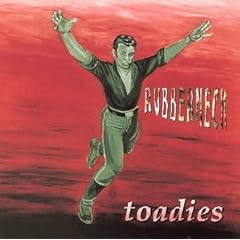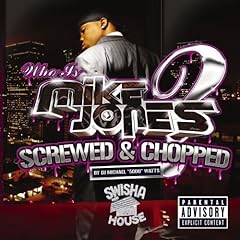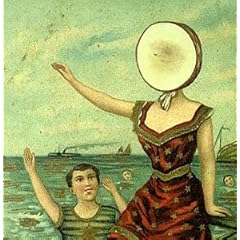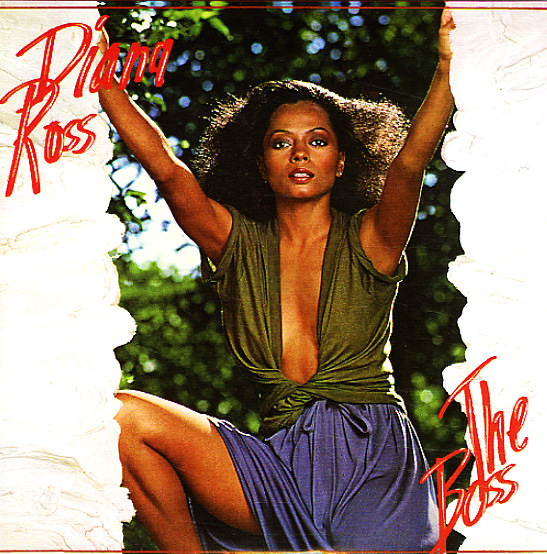Toadies - Rubberneck
Toadies - Rubberneck
by Joel Chaffee

Todd Lewis should’ve been raised by religious zealots and punished in tiny closets and other frightening Bergmanesque scenes. On achieving adulthood, he’d escape the house with his heart/soul/brain on fire. Fleeing to some place in Texas, he’d start a band that wrote a huge hit which nobody could totally comprehend that everyone said was about vampires. Only that last part exists outside my imagination actually, but damn, can’t you just see the rest?
My friend summarizes Rubberneck, for a long time Toadies’ only record, with a chuckle: I am angry and I don’t love Jesus. The first lyrics on the album ask, “Are you gonna save me?/Can you save me?” Lewis, over the course the album, fights to live in relentless opposition to salvation. Hardly a new rock and roll trope, this could be tiresome over an entire career, but in 36 minutes will certainly do.
Opener “Mexican Hairless” is all fast, cyclic power-chord riffs via Darrell Herbert’s lead guitar (as mean as Kanna and jubilant as the devil). Combines with second track “Mister Love” it makes a hectic monster of an intro, which heralds the threat, “We gonna show you a thing or two about love.” And still, the album doesn’t really start until song three, the torrential shuffle “Backslider.” The LP finally tells a story, about baptism and the fear of reversing one’s salvation: “And I threw up my hands/And I heard ‘Amen’/And I prayed 'Sweet Jesus, don’t let me become a backslider.’”
While the lyrics are angry, the riffs are positively buoyant. Like another dollar-bin favorite, Dandelion’s Dyslexicon, Rubberneck is the sound of a band as ballsy and visceral as punk but accidentally formed into hugely melodic pop. Perhaps there is a weirdness about the albums that set them apart. I find it difficult to name a band when prompted that “sounds like” the Toadies.
Perhaps the artistic success of Rubberneck is the simultaneity of its angriness and its joy. There are hooks all over the place; just about every rhythm, lead and bass guitar part is a hook. But the hooks snag like barbed wire; what's more, they like it. All Music Guide complacently compares the Toadies to standard-bearers Pixies and Nirvana; yes, Rubberneck is in the neighborhood of punk, and also of pop, but sounds nothing like pop-punk (a distinction they join with, ironically, Pixies and Nirvana). But all these references are fatuous and misleading. Rubberneck is its own entity; like a well read novel or well tread memory.
On “I Come From the Water,” Herbert squalls and sparks off harmonics through a jaunty progression just as “Mexican Hairless” earlier found him blistering high notes. His (and often Lewis’) strings are constantly bent and pulled and whammied and in all ways compellingly fucked with. The complications of little stutters or additional half-measures work themselves into the Toadies’ structures to throw the listener off; they are not writing hymns.
But it’s not all noise and pyrotechnics. “Tyler” is a sweet, creepy seduction. “I found a window in the kitchen and I let myself in / ...I stumble in the hallway / Outside her bedroom door / I hear her call out to me / I hear the fear in her voice.” This terrifying-yet-softhearted tale of lovers losing their virginity is the climax of the record. It is Lewis at his most articulate and primal, howling defiance—of culture, fear, religion. In case you did not hear, he comes from the water.
Near the album’s close is “Velvet,” as violent and wounded as the record gets with its opening cry, “Get away! / Get away!” over a hammered octave as Herbert snakes his way up the neck and the rhythm section builds towards “You hurt me, you fuck/cunt” verses. The sinister “Happyface” screams through choruses of “No no no more son of a bitch / No more happy face.”
There is redemption in closer “I Burn,” and the only acoustic guitar. The song’s dark bombast is as euphoric as a crippling accident. “Stoke the embers / Cleanse the spirit / A prayer in every spark / Feel the lick of bad religion.” The cleansing here is scary but how satisfying. No more backsliding or quitting or son of a bitch. “Fire is bright / Fire is clean / Efficient and divine.” It is real and definitive as a burn.
And of course, I still celebrate the big hit, “Possum Kingdom,” as fondly as the first time I heard it. “Do you wanna be my angel?” is dopey innocence and as direct as the songs’ initial command to “Make up your mind / Decide to walk with me / Around the lake tonight / ...I’ll show you my dark secret.” The song’s final and oft-repeated question, “Do you wanna die?,” sung in Lewis’ snide, satyr-like voice, is the most fun the record has this side of the water. “Do you wanna die?” It is less a question than a command. Yes, of course you do. Behind the boathouse. What is the dark secret? “I Burn?” Maybe. Something tells me it’s a lot more fun—and a lot scarier.
Joel Chaffee is a writer of prose, music, and poetry and the founder of artist collective Charity Case. He is 27 years old and in collegiate exile in Rochester, NY.
by Joel Chaffee

Todd Lewis should’ve been raised by religious zealots and punished in tiny closets and other frightening Bergmanesque scenes. On achieving adulthood, he’d escape the house with his heart/soul/brain on fire. Fleeing to some place in Texas, he’d start a band that wrote a huge hit which nobody could totally comprehend that everyone said was about vampires. Only that last part exists outside my imagination actually, but damn, can’t you just see the rest?
My friend summarizes Rubberneck, for a long time Toadies’ only record, with a chuckle: I am angry and I don’t love Jesus. The first lyrics on the album ask, “Are you gonna save me?/Can you save me?” Lewis, over the course the album, fights to live in relentless opposition to salvation. Hardly a new rock and roll trope, this could be tiresome over an entire career, but in 36 minutes will certainly do.
Opener “Mexican Hairless” is all fast, cyclic power-chord riffs via Darrell Herbert’s lead guitar (as mean as Kanna and jubilant as the devil). Combines with second track “Mister Love” it makes a hectic monster of an intro, which heralds the threat, “We gonna show you a thing or two about love.” And still, the album doesn’t really start until song three, the torrential shuffle “Backslider.” The LP finally tells a story, about baptism and the fear of reversing one’s salvation: “And I threw up my hands/And I heard ‘Amen’/And I prayed 'Sweet Jesus, don’t let me become a backslider.’”
While the lyrics are angry, the riffs are positively buoyant. Like another dollar-bin favorite, Dandelion’s Dyslexicon, Rubberneck is the sound of a band as ballsy and visceral as punk but accidentally formed into hugely melodic pop. Perhaps there is a weirdness about the albums that set them apart. I find it difficult to name a band when prompted that “sounds like” the Toadies.
Perhaps the artistic success of Rubberneck is the simultaneity of its angriness and its joy. There are hooks all over the place; just about every rhythm, lead and bass guitar part is a hook. But the hooks snag like barbed wire; what's more, they like it. All Music Guide complacently compares the Toadies to standard-bearers Pixies and Nirvana; yes, Rubberneck is in the neighborhood of punk, and also of pop, but sounds nothing like pop-punk (a distinction they join with, ironically, Pixies and Nirvana). But all these references are fatuous and misleading. Rubberneck is its own entity; like a well read novel or well tread memory.
On “I Come From the Water,” Herbert squalls and sparks off harmonics through a jaunty progression just as “Mexican Hairless” earlier found him blistering high notes. His (and often Lewis’) strings are constantly bent and pulled and whammied and in all ways compellingly fucked with. The complications of little stutters or additional half-measures work themselves into the Toadies’ structures to throw the listener off; they are not writing hymns.
But it’s not all noise and pyrotechnics. “Tyler” is a sweet, creepy seduction. “I found a window in the kitchen and I let myself in / ...I stumble in the hallway / Outside her bedroom door / I hear her call out to me / I hear the fear in her voice.” This terrifying-yet-softhearted tale of lovers losing their virginity is the climax of the record. It is Lewis at his most articulate and primal, howling defiance—of culture, fear, religion. In case you did not hear, he comes from the water.
Near the album’s close is “Velvet,” as violent and wounded as the record gets with its opening cry, “Get away! / Get away!” over a hammered octave as Herbert snakes his way up the neck and the rhythm section builds towards “You hurt me, you fuck/cunt” verses. The sinister “Happyface” screams through choruses of “No no no more son of a bitch / No more happy face.”
There is redemption in closer “I Burn,” and the only acoustic guitar. The song’s dark bombast is as euphoric as a crippling accident. “Stoke the embers / Cleanse the spirit / A prayer in every spark / Feel the lick of bad religion.” The cleansing here is scary but how satisfying. No more backsliding or quitting or son of a bitch. “Fire is bright / Fire is clean / Efficient and divine.” It is real and definitive as a burn.
And of course, I still celebrate the big hit, “Possum Kingdom,” as fondly as the first time I heard it. “Do you wanna be my angel?” is dopey innocence and as direct as the songs’ initial command to “Make up your mind / Decide to walk with me / Around the lake tonight / ...I’ll show you my dark secret.” The song’s final and oft-repeated question, “Do you wanna die?,” sung in Lewis’ snide, satyr-like voice, is the most fun the record has this side of the water. “Do you wanna die?” It is less a question than a command. Yes, of course you do. Behind the boathouse. What is the dark secret? “I Burn?” Maybe. Something tells me it’s a lot more fun—and a lot scarier.
Joel Chaffee is a writer of prose, music, and poetry and the founder of artist collective Charity Case. He is 27 years old and in collegiate exile in Rochester, NY.
Labels: Joel Chaffee





